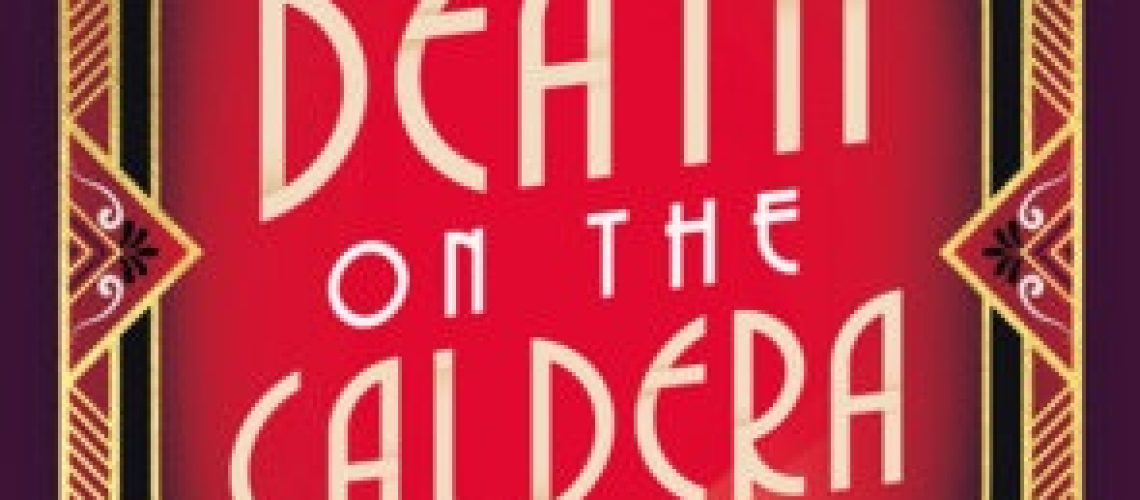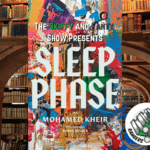Death on the Caldera is Emily Paxman’s debut novel, combining elements of steampunk fantasy, mystery, romance, and more. The characters (written in third person, past tense) include a trio of incognito royals heading back to their father’s deathbed in another country, the crown prince’s former lover and their illegitimate daughter, an unrelated naive nobleman, a temple acolyte, and a couple of rail-riders. The first few chapters introduce them and set them going on a luxury train trip, and then there’s a wreck in the wilderness. It’s unclear at first whether that’s due to accident or sabotage, but something unnatural definitely happened. What the trio discovers, and is desperate to keep secret, is that latent power has been awakened in one of them; it’s dangerously uncontrolled, and if it’s discovered, that’ll mean instant execution. Then the conductor is found with his throat slit.
The secret crown prince manages to get himself appointed to investigate what’s happening, partly to shield his sister, Davina. She started off the story struggling to separate from her family and be allowed to study volchemistry (volcanic alchemical magic) at a foreign university, but her brothers, Kellen and Morel, reveal that their father the king had forbidden this to try to keep her witchy nature from becoming known. She’s furious that they’d kept her heritage a secret from her, but gradually comes to understand how hard they’d been trying to protect her.
Volchemistry is a science that anyone can study, but witches are scary because their power is inborn, potent, and unregulated; since men aren’t witches, the trio’s country Halgyr bars all women from owning land or having power; the larger Balterian empire grants women much more freedom, but kills any discovered witches; the former Rencha realm used to work with its witches, but after a massive volcanic eruption, Balter conquered most of the remaining wasteland.
The book focuses much more on discrimination against witches and women in general than any analysis of monarchy; lower-class ex-lover Genna Freath and her daughter Rae, along with the pair of rail-riding siblings, occasionally ponder the unfairness of life, but they’re mostly just trying to survive. However, the book does spend some time on issues of empire; the Halgyrians are hanging on to independence, and people of the volcanic caldera wastelands are very restless under Batlerian dominance. Although the book resolves most plot threads fairly happily, it’s wide open for potential sequels to follow up on the characters and these issues.
I liked how grounded this book felt. The details of train service, survivors trying to recover after the wreck, the squabbling among various factions of train passengers, the differences between types of magic — all of these felt thoughtfully explored. The characters are pleasingly complicated, too; Davina and Crown Prince Kellen turn out to be much more layered than their initial presentations, and the temple acolyte often wavers in his purpose in the grand scheme of things. I also really appreciated how identity issues, so confusing and enervating for one character for quite a while, turned out to provide a key flexibility in one confrontation, too.
I found Death on the Caldera to be an intriguing and entertaining voyage. Despite the catastrophes and deaths, it’s actually one of the lighter books that I’ve read in a while, and there’s nothing wrong with that! If looking for a pleasant diversion, with problems and puzzles that are engaging enough to keep one’s interest, but not so challenging as to drag one down, this should be quite satisfying.
Titan Books is publishing Emily Paxman’s Death on the Caldera on June 17. You can preorder here.
Content warnings: Deaths, injuries, sexual discrimination, persecutions/executions of a minority, temporary harm to children, identity issues, empire/monarchy/colonialism issues.
Comps: Agatha Christie’s Murder on the Orient Express; “Horror Express” (1972 movie); K.J. Charles’ A Case of Possession.
Disclaimers: I received a free eARC from the publisher via NetGalley for review.







